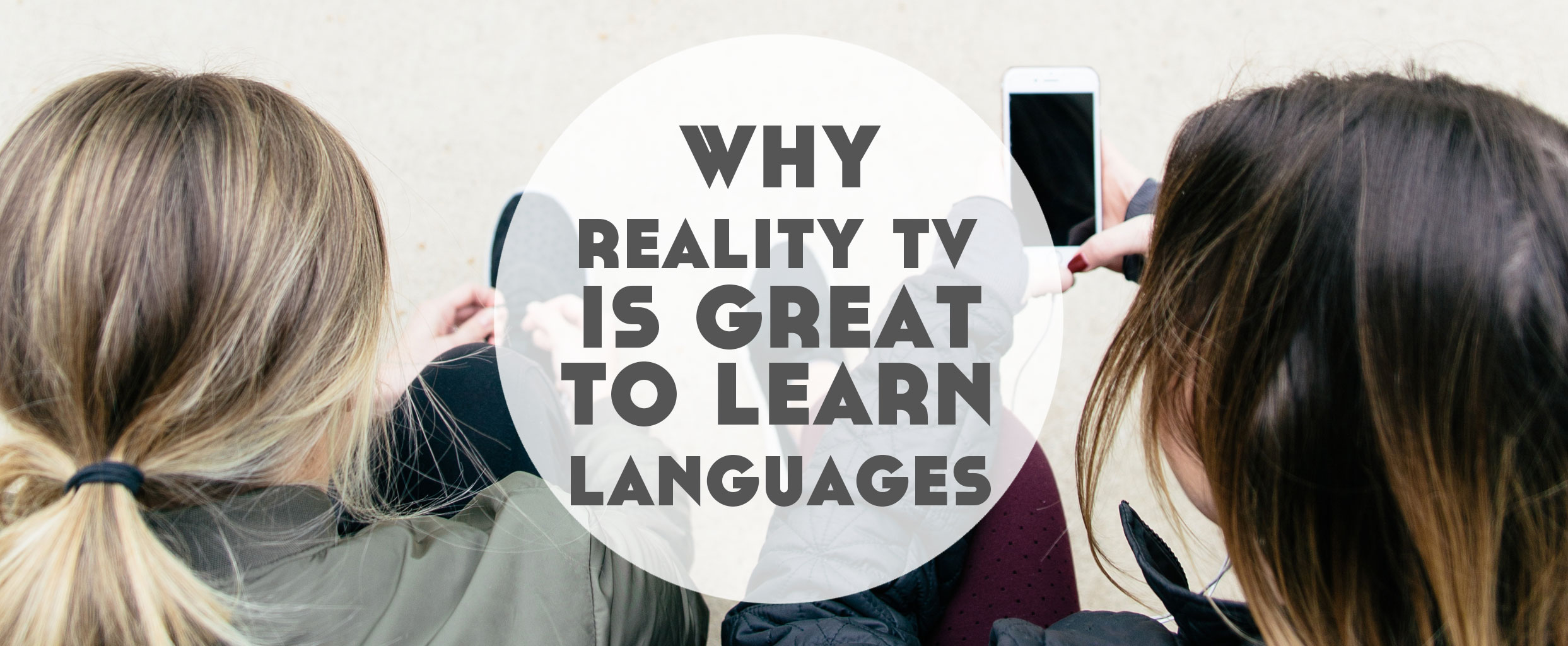Reality TV is my favourite type of TV for language learning. Read on to find out why + learn how to make the most of it.

I grew up in the Big Brother age. I was around 12 when Big Brother first launched in the UK.
At that time, it was tame enough for a 12 year old to watch. They had chickens, they had to budget for their weekly food together, and with the exception of ‘Nasty Nick’, it was all very lovely and calm.
As I grew up, so did Big Brother.
Now it’s gone and here in the UK we have Love Island that seems to have replaced it. Not quite suitable for a 12 year old, I imagine. But I’ve never watched that. I guess I grew up too much. (That said, I do still watch Made In Chelsea…)
So reality TV, at least in its modern guise, has very much been a part of my life from my formative years.
However, when it comes to language learning, it was something I’d never really considered until the arrival of Netflix, and one show in particular: Terrace House.
Terrace House is a Japanese reality TV show that’s more like the Real World than Big Brother. But it’s also not like anything else at all. Here’s a trailer for the latest series at the time of writing: Tokyo 2019-2020.
Cameras film 6 young and aspirational Japanese people (and sometimes ‘half’ Japanese, but more on that later) both in the house and out and about living their daily lives. The daily life stuff often involves modelling shoots, and extreme sports training, or performing gigs. So, you know, typical everyday jobs.
Typical for reality TV it would seem, right? Not exactly.
You see, the beauty of reality TV in different languages is that by default, that involves different cultures.
I’ve learnt more about Japanese customs and etiquette from Terrace House than from any textbook.
Like how you say ‘tadaima’ when you come home and will always get a ‘okaeri’ in response.
And like how it’s totally normal to ask someone who looks a little less Japanese if they are ‘half’ mere minutes after meeting them.
And like how holding hands is a much bigger deal in Japanese dating culture than any Brit on Love Island would have you believe about British culture.
But, spoiler alert, my attitudes to dating were never like Love Island would have you believe to be totally normal for every single Brit. That’s where Terrace House becomes incredibly useful as a cultural resources.
The beauty of Terrace House is that it’s kind of like two shows in one. As well as the main show of the people in the house, there’s also regular cuts to a group of comedians and presenters watching together. This means that when something happens that does seem a little unusual, they’re there to not react or be like “Woah! That was weird!”
This video nicely sums up Terrace House if you’ve never seem the show.
Recently, whilst learning Korean and looking for something to watch that’s not K-drama (I’m sorry, other than Boys Over Flowers, I’ve just struggled multiple times to get into one) I found Hyori’s B&B.
Hyori’s B&B has become my Korean equivalent to Terrace House. It’s giving me the same cultural education that only reality TV can give, it seems.
There’s no second group of people watching to clarify when stuff is “normal in Korea” or not, but there is a slight divide between Hyori and her husband (and to some extent their celebrity staff helpers), and the guests. So sometimes, they discuss each other’s actions in that sense.
Also, differently to Terrace House, Hyori’s B&B has text pop up, obviously added by editors post-filming, which tries to assume how people felt in certain situations.
Here’s a quick intro to Hyori’s B&B if you’re new to that one. This is a random clip but it gives you an idea of how different it is to Terrace House with text and sound effects etc, yet alike in the mundane simplicity of the whole thing.
So with that in mind, how does this really work? Can reality TV really be used for language learning? Let’s dive in…
How to Use Reality TV for Language Learning
Most of the suggestions would work just as well with any type of TV, but I really just wanted to make the case for reality TV as I know, like me, not everyone loves drama shows!
Cultural Insights
Reality TV can be a great in context introduction to many aspects of a culture, giving you some base knowledge to research further and ask your tutors and language exchange partners about.
For example, I knew from the start of learning Korean that honourifics and respect for elders is a big deal in Korean culture. However, with Hyori’s B&B, I saw this in action when an elderly couple visited the house.
It’s also great to see attitudes to food and drink, for example.
Hyori and Sang-Soon make tea in an almost ritualistic way, with a full tea set on a tray that includes a cup for the initial bloom among other things. Of course, this could just be them or a small number of Koreans that do this, but it’s still an insight into something I don’t imagine many people doing at home in the UK.
Key Phrases in Context
The easiest way to use reality TV for language learning is to listen out for those key phrases that you hear again and again.
With Hyori’s B&B, they say ‘yeobuseyo’ when they answer the phone, which contradicts what I’d heard on a YouTube video!
I hear them say ‘kaja’ when they get ready to leave the house or walk the dogs.
With Terrace House, I noticed the words they say upon entering the house, and the response that everyone already there gives.
These things happen a lot in these types of shows. This means there’s plenty of chances for repetition without boring rote learning!
Read interviews or reviews of the show
A great way to expand beyond the show itself is to find interviews or reviews of the show online to read.
You might even find YouTube videos or podcasts here too, which would work well as extra listening practice. This is much more appealing because it’s on a topic you enjoy.
As I mentioned, I’ve noticed as well with Hyori’s B&B, there’s lots of text that comes up on the screen too.
Onomatopoeia type words and also these presumptuous statements about how the cast are feeling, such as “He’s sad because she’s sick.”
How they know for sure he’s sad and that her being sick is the reason why, I don’t know. But anyway, there’s extra text with that show as I watch, which is a nice bonus.
Stimulus for Free Writing
TV, whether it’s an entire series or an episode, or even a scene, can make for a great stimulus for a free writing piece.
Write a summary of what’s happened, what you think will happen next, or what you’d like to happen next. (See those chances for using different tenses there?)
Write an email, a review for a magazine, a script for a play. Get creative with the format and pick one to help give you some direction and structure.
Maybe even write a poem about the show! You’ve got complete creative control here.
If you’re looking for some inspiration for writing, here’s All The Writing Resources for Language Learning That You’ll Ever Need
Record Your Spoken Opinions
What do you think of the show? Record your opinions spoken aloud.
Of course, this works well as a follow-on activity from the free writing because you can simply record what you wrote.
Alternatively, if you’re feeling confident enough in the language to do it, go in with no plan and just start speaking as soon as you hit record!
Related: All The Speaking Resources You’ll Ever Need.
Change Tenses, People, Gender etc to Test Your Grammar
Pick a topic, any topic.
Just been reviewing how a certain tense works in that language? Watch a clip from the show. Pause it. Change the sentences you’ve just heard to that tense.
You can even expand to create further sentences related to the ones you’ve just switched.
Mindmap Vocab
With my current level in Korean, this one’s my favourite.
Simply watch a clip of the show until you catch a word/phrase you want to learn more throughly.
Start to mindmap that word and do some outside research to learn more related words.
Remember those onomatopoeia words I mentioned that always show on screen in Hyori’s B&B? I spotted one that led me to learning many more through this activity.
To show you how this works, I recorded myself doing it for this video too.
To catch more videos like this, be sure to subscribe to my channel on YouTube.







